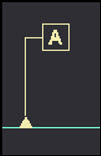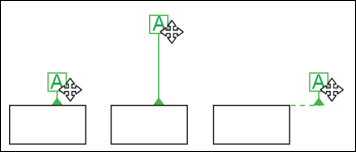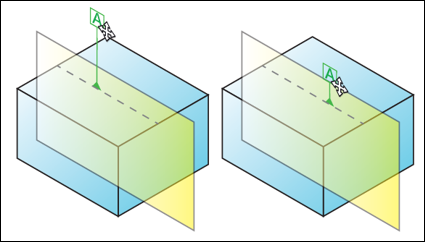To Move a Datum Feature Symbol
You can drag the datum feature symbol and move it to the place that you want. You can perform the dragging of Datum Feature Symbol in two ways using two draggers:
Primary Dragger
It is available on the DFS frame. You can drag the frame on the plane on which you have created the DFS.
|
|
In model-based definition, the movement of the DFS is restricted only within the annotation plane.
In drawing, you can move the DFS beyond the annotation plane. You can move the DFS outside the annotation plane.
|

In drawing, the dragging of the symbol is performed over the drawing, preserving the attached entity. During the dragging, the plunger slides along the reference geometry or reference extension and the dragged frame is moved together with the pointer.

In part or assembly, the symbol dragging is performed within the current annotation plane passing through the attachment point. Dragging is performed, preserving the attachment entity. During the dragging, the plunger slides along the reference geometry within the actual annotation plane; the frame follows together with the pointer. In this case, plunger does not exceed the reference geometry boundaries.

Secondary Dragger
It is available on the attachment position available on the plunger. When you click the attachment point of the DFS, a small black square is created. You can click the black square and drag the DFS in any direction within the plane.

In drawing, the secondary plunger dragger provides you with the two-directional movement of the symbol along the reference geometry or its extension. The in-symbol leader and frame are moved together with the plunger preserving their length and orientation.
In model-based definition, with the secondary plunger dragger you can move the plunger attachment point along the reference entity. The symbol frame and leader are moved together with the dragged attachment point preserving their length and orientation. The plunger is moved within the reference boundaries. The actual annotation plane does not change its orientation during the plunger dragging, but is dynamically moved together with the dragger.